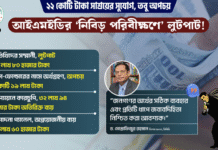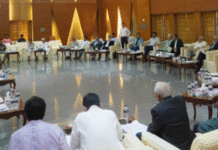Liberation war, religion no longer election issues
 About two decades ago, a young man spoke to me about a rather audacious proposition. He spoke of prohibiting the use of two issues during the election – religion and the liberation war. That was quite an audacity at the time. After all, Awami League had declared itself to be a pro-liberation force. BNP maintained that it was for Bangladeshi nationalism, which was seen to reject the secularism of Bengali nationalism. That young man, now so many years older, may be relieved to see the liberation war and religion are no longer issues being used in the election.
About two decades ago, a young man spoke to me about a rather audacious proposition. He spoke of prohibiting the use of two issues during the election – religion and the liberation war. That was quite an audacity at the time. After all, Awami League had declared itself to be a pro-liberation force. BNP maintained that it was for Bangladeshi nationalism, which was seen to reject the secularism of Bengali nationalism. That young man, now so many years older, may be relieved to see the liberation war and religion are no longer issues being used in the election.
This is no ideological revolution of any sort, but a matter of circumstance. Circumstances have pushed ideology to the back burner. That is why a former secretary general of BNP, and indeed president too, who had staunchly upheld Bangladeshi nationalism, is now part of the coalition forged by Awami League, the party which had so vehemently opposed Bangladeshi nationalism and promoted Bengali nationalism. Then again, Hussain Muhammad Ershad, who introduced Islam as the state religion, has also decided to contest in the election from the Awami coalition.
On the other hand, many of those who deeply believed in the political ideology of Bengali nationalism, and were in prominent positions, have now joined the nationalist BNP coalition. It is clear that positions can change, particularly when there is the lure of power.
We must keep in mind that the question of religion and the liberation war in politics has already been resolved. Actually, Bangladesh was founded after this question was resolved. Religion is a matter of personal belief and behaviour. This has nothing to do with the state. Through the process of the liberation war we reached the decision that religion can’t be mixed with politics. It was breaking away from religion-based nationalism that Bangladesh was born. So why should this issue be raised again? We all know why. It is all about winning the election. That motive drives both camps to woo religion-based political parties.
The liberation war and its spirit are not unresolved issues either. It was on the basis of the liberation war that this state was established. There is no need for any verdict in favour of the liberation war, no need for a referendum. It can be taken for granted that, save a few traitors, all citizens of the country support the liberation war. Making the liberation war an issue actually facilitates the traitors. And another danger is that the liberation war bears the onus of the success or failure of a particular party. Why should the spirit of the liberation take on the liability of a party?
So it looks like the liberation war and religion will not factor in the coming election. After all, there are pro-liberation elements on both sides of the political spectrum just as there are enthusiasts overly willing to use religion.
There is need, or course, for an election narrative. Awami League speaks of the development made under its rule. The other side calls for the revival of democracy. Whatever the case may be, the bottom line is, the liberation war and religion are no longer being used to win votes. That is a good sign indeed.
The business of using religion in politics is nothing new. This business thrived well during the British rule and that of Pakistan too. It was the people who had to pay the price for this. Religion was held up high and basic issues of food, clothing and shelter were ignored. That ‘tradition’ lingers.
The business of using the liberation war is relatively newer, introduced immediately after the winning the 1971 independence struggle. About a decade after victory, I saw written in a profile of an eminent person that he had been a valiant freedom fighter and was now an established businessman. I wasn’t too comfortable with that. Why should he have to declare that he was a valiant freedom fighter and now a successful businessman? I realise now my discomfort was misplaced. It’s all about the times. In 1971 he was meant to be a freedom fighter and he was so. Things changed after 1971 and it was time to be wealthy and he was so. He could also use his freedom fighter identity to further his business.
Signboards are effective tools in the capitalist system. I once read a story. There were three adjoining shoe shops located in a big town in America. Two of the shops were busily preparing for Christmas, cleaning the shops, putting up decorations and so on. They were bringing in the latest shoes and announcing special sales and so on. The shop in the middle was quiet. Was it going out of business or what? But at the last minute, its signboard was replaced with another one on which it was simply written: ‘Only Entrance’. So the customers who were lured by the decorations of the two other shops came and entered this one in the middle, thinking this was the only entrance to the other two shops, and happily did their shopping here.
Now more than signboards, it is all about brands. Our two political coalitions are not faring too well when it comes to branding. But they have loud voices, spewing out rhetoric about either development or revival of democracy. The ruling party makes big claims of development. The other side declaring the revival of democracy says that their participating in the election is part of their movement. People tend to like the sound of a movement.
When the elections arrive, many people vie to contest. Joining the political aspirants are business persons and retired civil and military bureaucrats, all aspiring for candidature. It is as if they have been born to serve the people. But the voters are not reassured. They have their suspicions about wolves in sheep’s clothing.
But the voters have clout. What will their stand be in the coming election? They will vote in one of the two major political parties. They have no other alternatives. The intellectuals will have their own equations about which side to choose. The common people do not appreciate such advisers and their political parties, but what can they do? They have no party of their own.
I’ll end with another story. A dead body was being carried to the cremation grounds when a quarrel broke out between two groups. One group said they were going the wrong way and the other group said they were taking the right route. The fight grew fierce while the body was thinking, ‘I know both these groups but I can say nothing. I am just a corpse.’
Do the people face the same predicament as that corpse?
- Serajul Islam Chowdhury is emeritus professor, Dhaka University. This piece appeared in print in Prothom Alo has been rewritten in English by Ayesha Kabir.









